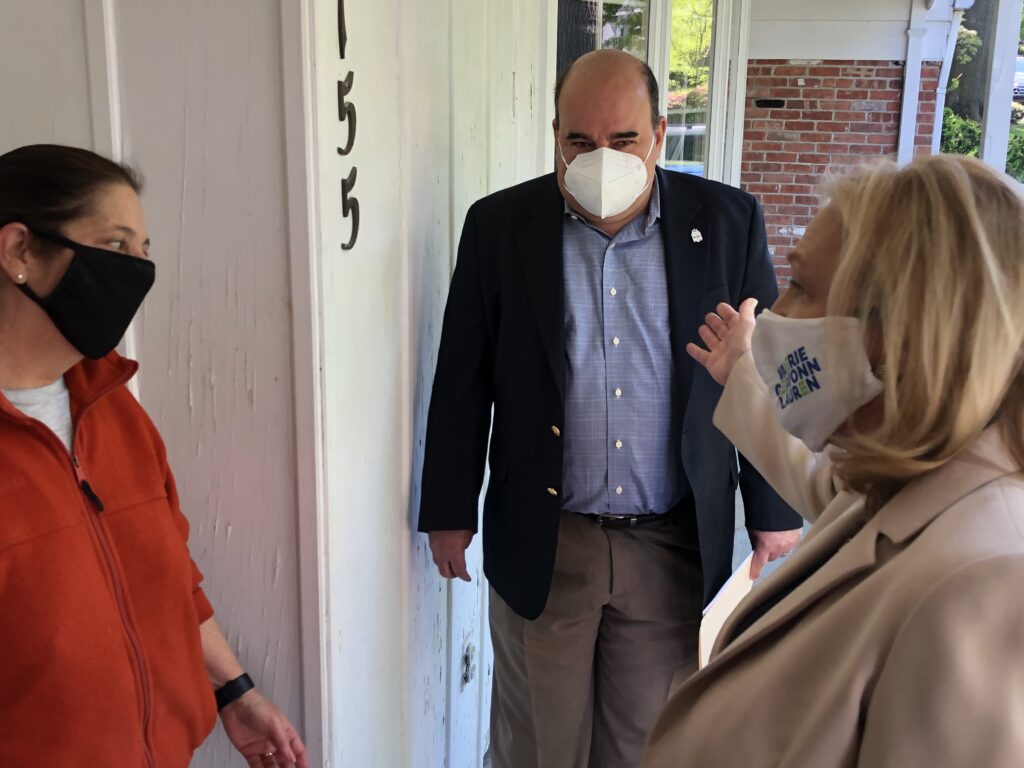Anatomy of a Collision Course: The LD37 Democratic Primary

The battle to succeed Senator Loretta Weinberg in LD37 has set Assemblyman Gordon Johnson and Assemblywoman Valerie Vainieri Huttle on a crash course in a race that has been as awkward as it has been contentious. What follows here is a synopsis of some of the features that have defined the campaign leading up to Primary Day.
The genesis of it took root in Bergen County and the retirement of Weinberg, the matriarch of
[caption id="attachment_66774" align="alignright" width="300"] Bergen County Democratic Committee Chairman Paul Juliano.[/caption]
Bergen County Democratic Committee Chairman Paul Juliano.[/caption]
progressive politics in the state of New Jersey, from her long tenure in Trenton. The two assemblymembers took off—Johnson, the establishment favorite, and Huttle, who claimed to be a focused, progressive candidate shafted by the system. Some political wonks ascribed blame to BCDC Paul Juliano for allowing such a collision in the first place, but the matter is moot for the moment. Nevertheless, this may represent a deepening divide within the Bergen Democrats between conventional Democrats and those who claim to carry the standard for the progressive wing which can represent a reconciliatory challenge for the chairman once the primary smoke has cleared.
Given how deeply blue the district is, there is almost an absolute certainty that the next state senator will be Johnson or Huttle. For all intents and purposes, the primary is the election—barring unforeseen events, of course.
[caption id="attachment_115205" align="alignnone" width="2460"] From left to right: former Englewood Cliffs Councilwoman Ellen Park, Assemblyman Gordon M. Johnson, former Tenafly Councilwoman Shama Haider.[/caption]
From left to right: former Englewood Cliffs Councilwoman Ellen Park, Assemblyman Gordon M. Johnson, former Tenafly Councilwoman Shama Haider.[/caption]
Johnson announced his candidacy in mid-January. Weinberg has since backed Johnson, who has proudly and frequently announced that he has Murphy’s endorsement as well. By lining up the machine behind him, Johnson presents himself as a “consensus choice” as well as a man of compromise.
Huttle has depicted Johnson as a low-energy candidate whereas she is the one to get her hands dirty and push legislation through. As each of the candidates rolls up their respective endorsements, Huttle has been shaping the narrative that she is the “progressive” choice of the two, fighting to protect issues such as abortion, immigration reform, human trafficking, and the Anti-Bullying Bill of Rights, described by the Star-Ledger as the “toughest anti-bullying law in the country.”
While Johnson may have the majority of establishment support, including the governor, many “progressive” organization, among them Sue Altman’s NJ Working Families, have thrown their support behind Huttle.
“I don’t just show up to cast my vote,” Huttle said, “I do the hard work of writing the landmark laws that make our state safer, healthier, and more equitable, that’s what a real leader does.”
The implication, of course, is that her former Assemblymate does not.
Johnson has longevity and experience, along with strong connections and vital relationships inside the district as well as the Trenton establishment. On the whole, this kind of political foundation means that the structure can be very effective. In the end, the results speak for themselves and voters will judge a lawmaker based on what that person can deliver. Both Johnson and Huttle can stand on their records, and tout their own bases of support as justification that neither is, in fact, just talk.
In late February, growing frustrated with the party process which she believed favored Johnson from the start, she issued a letter to Chairman Juliano, saying, “I write to respectfully inform you that I will not be participating in the Bergen County Democratic Convention on March 15th. I am running for State Senate in the June primary.” Huttle continued, blasting the party establishment by saying, “I will not allow a predetermined outcome to shape the future of District 37.”
In the same letter, she penned a line that would become one of the featured elements of her campaign, that of a tenacious woman standing up to a powerful man. “Respectfully, I am truly perplexed why you have made the decision to shut out a qualified candidate before this race even started. It is not in the best interest of our party and certainly not in the best interest of winning this November. Too often, the drive and ambition of women who want to use their voice to make a difference is dismissed with a ‘it’s not your turn.’ If I walked away every time men like you told me to back off, I never would have been elected in the first place.”
In no uncertain terms, Huttle contended that she was trying to break through a “glass ceiling.” It was a peculiar tactic to employ the glass ceiling reference, however, when a Caucasian woman is seeking to succeed another Caucasian woman in a race against an African-American man, but such is New Jersey politics in the 21st Century.
Tenafly Democratic Municipal Committee Vice Chair Max Basch wrote to Insider, saying, “Both Assemblywoman Valerie Vainieri Huttle and Assemblyman Gordon M Johnson are well known to me and I consider both of them to be outstanding representatives of our district. They are both actively working to become the Democratic Party’s replacement for our legendary State Senator, Loretta Weinberg. With stellar reputations, there is no doubt that both candidates deserve the nomination. The reality is that with only one available Senate seat, only one can be selected and this is the reason for the existing political race.”
Basch rejected the idea that Johnson—his pick of the two—had built up his support from the top down, but rather from a “wide range of people” which came from “all walks of life”.
“There is also a real ‘Glass Ceiling’ that for centuries,” Basch continued, “has kept both women and African Americans from elected offices and appointments to higher positions in politics as well as private corporations. While this Glass Ceiling has not been in any way been eliminated, we are so lucky to be in a position, thanks to Loretta Weinberg, who broke the Glass Ceiling for the last three decades, to allow these two candidates to walk in her footsteps to fill her position without having to break that ‘Glass Ceiling’ anymore.”
That part was expected language but not without its logic, to be sure.
Johnson demonstrated his political savvy and that counts for much in Trenton and on the campaign trail. The former cop and Desert Storm veteran backed Craig Coughlin for Speaker and jumped on the Murphy bandwagon from the start. Both paid off dividends for Johnson and he maintains friendly relationship with the governor’s office. Nevertheless, Johnson’s campaign hit a bump in the road when Teaneck Democratic Committeewoman Alexandra Soriano-Taveras called for a boycott of predominantly Jewish-owned businesses on Cedar Lane. It was looking like she would get the line until then. Johnson said that she had “made a mistake” and that it was “unfortunate” describing her as “a good candidate” but ultimately deferring the matter to the party.
Both Johnson’s running mates at the time, Soriano-Taveras and Palisades Park Mayor Christopher Chung, whose own town is embroiled with domestic matters, left the campaign. Johnson originally had a slate representing African-Americans, Latinos, and Asians. His ticket is now represented by assembly candidates Shama A. Haider, a Pakistani-immigrant and Tenafly Democratic Chair, and Ellen J. Park, a Korean-American and former Englewood Cliffs councilwoman.
Huttle is marching into the primary with an all-female ticket: Gervonn C. Romney-Rice, an African-American native of Teaneck with Board of Education and Council credentials, and attorney Lauren M.K. Dayton who serves on the Tenafly Council. They are running under the line “Real Bergen Democrats.”
[caption id="attachment_118221" align="alignright" width="200"] Dr. Dierdre Paul[/caption]
Dr. Dierdre Paul[/caption]
The campaign took a turn for the truly bizarre when Dr. Dierdre Paul entered the mix. Paul, who is the Bergen County Women’s Republican President, had been a Democrat and charged that Johnson made inappropriate sexual remarks to her in 2008 when she was seeking a spot on the Englewood Council. Paul said that she had informed other Democrats—Weinberg and Huttle among them—but nothing came to pass. Johnson denied the allegation and said that no one had ever accused him of such behavior before.
This came to a head when the Huttle campaign began accusing Johnson of covering up sexual misconduct. The campaign released a biting statement, saying, “Let’s get one thing clear, you cannot claim to support survivors when you have remained silent in the face of your own sexual misconduct allegations. You certainly cannot claim to believe survivors when you’ve remained silent. Gordon, you brought this up- now you need to come clean.”
This move by the Huttle campaign so infuriated Paul, seeing her experience as being used for political leverage, that she lashed out. “So, apparently, I thought you were a friend and I told all of my friends about the incident discussed in the email that has been so widely publicized by someone other than me,” Paul said. “I want you to hear how I am affected each time you use my story for your own political advantage and reinforce negative stereotypes that Black women are often willing to be used by the White, political establishment (even if it is for the purpose of disparaging Black men) for mere trinkets and a little media attention that wouldn’t be offered to a thinking person.”
Paul was clear that she was not issuing an endorsement of Johnson, but conceded that of the two, Johnson would better serve the people of the district.
It’s enough to make one’s head spin.
One lens, for those outside of the Bergen bubble, is that this race presents itself as “establishment” vs. “progressives”—not unlike the other side of the coin, where the Republican Party is trying to come to terms within its own ranks. Huttle has been able to produce a narrative, from her angle, that the race is of a woman seeking to dislodge an unfair, male-dominated party structure (despite Weinberg’s presence and her own manifestation of the party establishment). Governor Murphy, backing Johnson, must be demonstrating the experience gained from his time working within the party and political apparatus of the state, in contrast to his initial or even ill-designed forays into Bergen county early in his governorship.
When Democrats go to the polls on Primary Day, and effectively choose Weinberg’s successor then and there, the chapter can finally be closed on one of the most dizzying state-level races of the season. The fall-out from the race and how the Bergen Democratic landscape is affected will then fall into the laps of the chairman and committees. They will have the task of reconciling or reckoning with the contentious factions.





